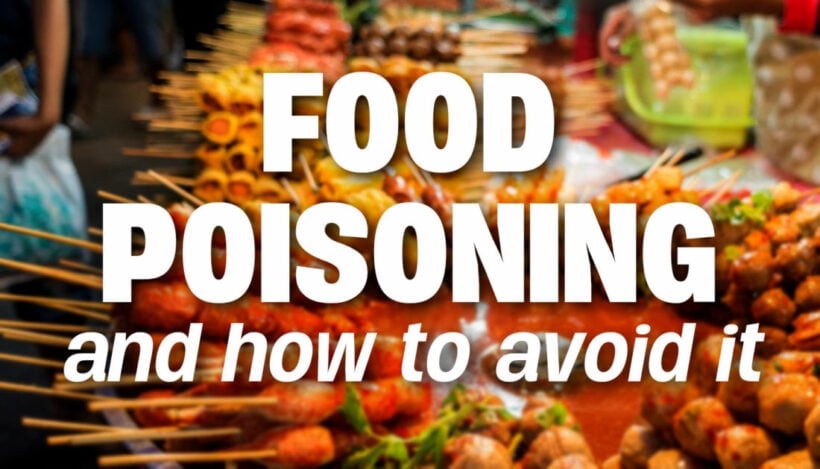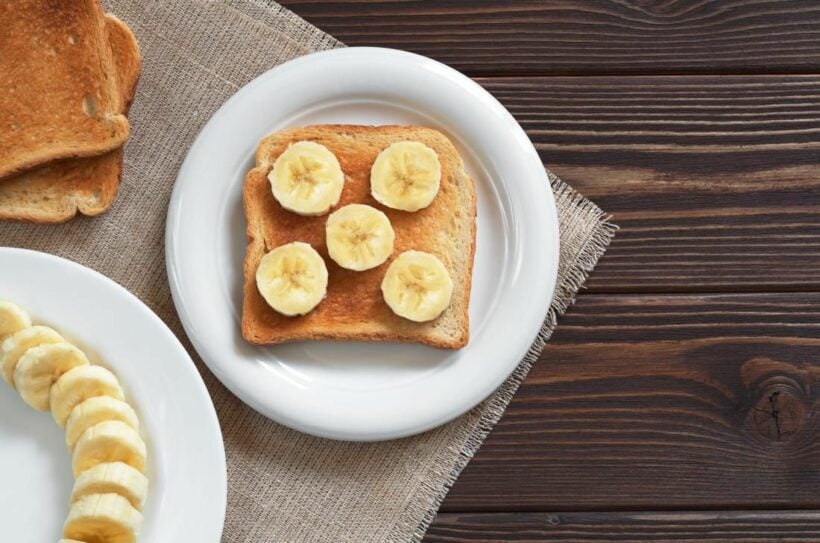Top 10 ways to avoid food poisoning in Thailand, and tips on how to recover

NOTICE: The Thaiger are experienced travellers but we’re not doctors. This information is provided as a general guide if you are confronted with food poisoning. In all cases consider seeking medical attention and make sure you have adequate travel insurance.
Travelling in foreign locations and trying out the local dishes will always risk a bout of the dreaded food poisoning – Bali belly, Thailand tummy. Thailand has some of the world’s tastiest food but also the potential to put you flat on your back for a few days.
| But don’t let that stop you from getting the chance to WIN A 3-NIGHT TRIP TO PHUKET and taste their delicious cuisines! Simply answer The Thaiger’s audience survey because Your Opinion Matters! Your feedback will help us enhance our content, ensuring we bring you the best travel tips and guides. Help us and you get to stay at the Four Points by Sheraton in Phuket! |
Travelling around Thailand you face a double whammy of exotic new spices along with an equally exotic list of new microbes and bacteria working hard to make your day a bad one. One bit of bad luck and you’ll disrupt the delicate balance found within your digestive system.
Contaminated water? Spoiled meat? Food left out in the open for too long? Whilst the vast majority of Thai food, even the street food, is unlikely to upset your digestive system, the more adventurous your eating, the more likely you are to confront a bout of food poisoning along your journey.
It will start with stomach cramps, nausea and sweating. It will usually kick in in the first four hours after your meal, probably earlier. You’ll know about it!
Projectile vomiting and diarrhea are usually the result and the next 10-12 hours of your life will be spent in close proximity to a toilet. You will feel like death-warmed-up… chills, cramps, maybe a fever and lots of sweating. But you WILL get over it.
Here is The Thaiger’s Top Ten ways to avoid, or recover from, a bout of food poisoning.
Don’t get food poisoning!
The best way to avoid food poisoning, or its lesser partner, traveller’s diarrhea, is not to get it in the first place. But even the most cautious tourist can consume something they think is safe… but isn’t.
Avoiding food poisoning is everyone’s obvious aim, but if it does happens it’s not the end of the world. Be cautious, read up about potential problems and turn you brain on before you go ‘full commando’ on food you’ve never experienced.
(No fresh leafy greens)
Unless you are absolutely sure they have been copiously washed with filtered water it is best to avoid eating anything in this category. Cooked greens are usually ok, especially in boiled soups. Try to also avoid raw unpeeled fruit or vegetables as well.
Salads in a street restaurant, somewhere off the beaten track? Probably not.
Street food
Street food, literally food you can buy on the kerbside or footpaths anywhere in Thailand, often looks and smells amazing, and is usually safe to eat. But avoid anything that looks like it’s been sitting around in the sun and humidity for a few hours. Stick with bubbling boiling soups, freshly fried Pad Thai, and meat that has been grilled right in front of you.
Ice ice baby
The vast majority of restaurants and bars in tourist areas use ice that comes from frozen purified water and have it delivered daily. Off the beaten track it’s best to ask first if the ice (nam kang) is made from tap water or is fresh that day. As they say, when in doubt, leave it out – better a warm beer than half a day leaning over the toilet 🙂
Drinking water
It’s best to observe the golden rule about drinking water in Thailand – never drink the tap water. The down-side is that most of the potable water is going to come to you in a single-use plastic water bottle which we’re all trying to avoid these days. Most hotels, and some restaurants, will have drinking stations where you can top up your water safely.
Drinking water is very cheap in Thailand and is available everywhere, like EVERYWHERE!
All that said, we suspect that in places like Phuket, Chiang Mai, most of inner Bangkok, Pattaya and Hua Hin, the water out of the tap IS safe to drink these days. But don’t take our word for it! As a traveller, you need to err on the side of caution.
Leftovers
“Mmmm, that pizza was great last night. I’ll have the rest tomorrow.”
Maybe, but you need to refrigerate it before it gets cold and then eat it quickly the next day before it has time to ‘warm up’. If it’s more than a day old, throw it out or feed it to the dog or cat who have cast-iron stomachs compared to humans.
Ditto for any other leftover you think you’d like to save for the next day.
Rehydration
If you are experiencing diarrhea or vomiting you need to make sure you rehydrate properly. If you are not doing a great job holding water in, go to the nearest pharmacy and pick up Oral Rehydration packets, they’re very cheap and freely available.
If you are suffering from food poisoning in Thailand you will do well to grab some of these packets to keep on hand. Meanwhile, keep up your fluids if you’ve suffered a bout of food poisoning.
Seek Medical Treatment
If it’s a mild case you are probably going to be able to self-medicate your way back to health. If it’s serious and you’re just flat on your back (between rushing to the toilet) for more than a day, then you’d be advised to seek medical attention. If you have blood in your vomit or stools, or high fever lasting more than an hour or so, seek medical attention urgently.
Thai doctors usually go down the medication route whereas some western doctors would now specify a more natural approach to recovery. If you have medical and travel insurance (you’re insane travelling without both!), and are in places like Bangkok, Chiang Mai, Phuket, Pattaya, Samui, Hua Hin or Khon Kaen, then head to a private international hospital, rather than a local hospital.
There’s nothing really wrong with the local hospitals – you will be charged less but you will be charged – but there’s more language barriers and waits at a time when you’re not really focussed on anything except how sick you feel.
A better choice would be a local clinic – Google is your best friend here or ask you hotel or someone with some local knowledge.
A note of caution…. A lot of people use to take Loperamide also known as ‘Imodium’ when they had diarrhea in the past. Generally medical advice these days is NOT to take these drugs unless you consult a doctor first.
Rest and time
Your body will use a lot of energy trying to evacuate whatever is making you sick. Sometimes you will wonder if it’s ever going to stop! It’s just a never-ending source of hell. But at some stage it will calm down and your poor body will be exhausted. So rest.
Don’t be afraid to miss out on a couple of days of activities as a result – put your body and recovery ahead of anything. For now you need lots of sleep and rest… and keep up the fluids.
Be a BRAT
For a few days stay off the exotic foods that put you here in the first place. Go bland, go BRAT. The BRAT diet is tried and tested and, whilst not very exciting, will help the flora of your stomach recover quickly while getting enough nutrients to keep you going.
BRAT stands for bananas, rice, applesauce and toast. Yeah, bland indeed.
You can add to this boring palette with other gentle foods… plain biscuits, oatmeal, weak tea, apple juice or flat carbonated drinks (just open them and let them sit for a few hours to lose their ‘fizz’), bland ‘broth’ soups and boiled potatoes.
Here are foods to avoid during your recovery… milk and dairy, anything fried, greasy, fatty, or spicy, steak, pork, salmon, and sardines, raw veggies, including salad greens, carrot sticks, broccoli, and cauliflower, fruits, such as pineapple, orange, grapefruit, apple, and tomato, very hot or cold drinks, alcohol, coffee, or other drinks containing caffeine. Yep, all the good stuff, rr Thai food generally!
After a few days on BRAT you can start trying things like soft-cooked eggs, cooked fruits and vegetables, and white meat, like chicken or turkey.
Importantly, until your body has finished getting rid of ‘whatever is ailing you’, don’t eat anything. It will just end up, along with everything else, making a quick journey from one end of your body to the other.
Start drinking flat soda (lemonade) or carbonated drinks, or ‘Gatorade’-style electrolyte drinks (you can powders from any Pharmacy) as soon as you can to keep the body hydrated, even fresh coconut water, but make sure it’s fresh.
Dehydration is a big problem following a bout of vomiting and diarrhea so focus on getting some fluids back into your system as soon as you can tolerate it.
That’s our quick top 10 tips about food poisoning in Thailand. Hopefully you’ll avoid it but, if it does happen, you’ll find these tips are a good guide to getting back on your feet quickly.
I’m happy to say that over 11 years living in Thailand I’ve only had food poisoning twice, in one case a pizza and the other time a convenience store meal I’d left in the fridge just a bit too long.
Your best plan is to spend your time exploring the amazing food here in Thailand, and as little time as possible leaning over the toilet.
Thanks for watching.

Latest Thailand News
Follow The Thaiger on Google News:


























